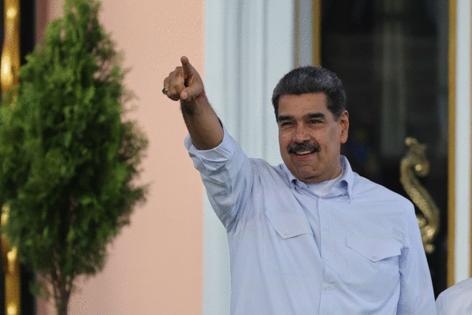UN sounds alarm over worsening human rights crisis in Venezuela
Published in News & Features
Civil and political freedoms in Venezuela have sharply deteriorated over the past year, according to the United Nations’ top human rights official, who cited a wave of arbitrary arrests, disappearances and alleged torture amid growing political unrest.
In a presentation before the U.N. Human Rights Council in Geneva, High Commissioner for Human Rights Volker Türk said Friday that the Venezuelan government has intensified its crackdown on dissent, using vague anti-terrorism laws to detain opposition figures, activists and foreign nationals ahead of the country’s contentious 2024 elections.
Türk also criticized the United States, expressing concern over the deportation of Venezuelans back to what he described as unsafe conditions.
“I repeat my call on the U.S. government to ensure compliance with due process … and to stop the removal of any person to any country where there is a risk of irreparable harm,” he said.
Deportation flights resumed this year as part of U.S. efforts to curb irregular migration. Rights groups warn that many deportees face retaliation or mistreatment upon return to Venezuela.
Türk’s report details at least 70 politically motivated arrests in the lead-up to recent regional and parliamentary elections, including 17 foreign nationals. Following the vote, authorities announced the dismantling of a so-called terrorist network allegedly tied to humanitarian and rights organizations — claims Türk dismissed as a misuse of counterterrorism legislation.
The U.N. rights chief called for the “immediate and unconditional” release of all individuals arbitrarily detained, naming several high-profile human rights defenders, including Rocío San Miguel, Javier Tarazona, Carlos Julio Rojas and Eduardo Torres.
According to the report, some detainees have disappeared without a trace, while others face legal proceedings without basic safeguards. At least 28 enforced disappearances were documented after Venezuela’s July 2024 presidential election, including 12 foreign nationals who were reportedly denied access to consular support.
Since the election, more than 2,000 people have been arrested, including minors. Dozens of political opponents and protesters have been killed or have vanished. Victims include not only Venezuelan citizens but also foreign nationals, such as Colombian aid worker Manuel Tique and French-American tourist Lucas Hunter, both missing since late 2024.
The humanitarian crisis is compounded by Venezuela’s crumbling infrastructure. Power outages and water shortages are frequent, and inflation has made basic goods inaccessible to much of the population. According to the U.N. Food and Agriculture Organization, more than 5 million Venezuelans are facing hunger. Preventable diseases like malaria and measles are spreading amid a collapsed healthcare system. Public services have disintegrated, and violent crime — including kidnappings, armed robberies, and extortion — is widespread.
“My office documented 32 cases of torture and ill-treatment in detention,” Türk said, noting that nearly half involved minors. Inmates were allegedly held incommunicado and denied medical care, food and water — particularly after protesting prison conditions.
Türk also warned of increasing restrictions on civil society. A law passed in November regulating non-governmental organizations has made it nearly impossible for many advocacy groups to operate. Organizations now face unlawful registration demands, arbitrary fees and administrative barriers not clearly defined in the legislation.
Several non-governmental organizations “have felt compelled to end their operations in Venezuela because of legal obstacles,” he said.
His report describes an atmosphere of fear that disproportionately affects women, marginalized communities, and LGBTQ+ individuals. Women remain underrepresented in public life, and victims of gender-based violence continue to face systemic barriers to justice. Abortion remains criminalized in all cases, including rape and incest.
LGBTQ+ individuals, Türk added, often face abuse while in custody, and many hate crimes go unprosecuted.
While focused largely on political rights, the U.N. report also highlights Venezuela’s deepening economic collapse. With inflation worsening, the monthly minimum wage remains at just 130 bolívares — less than $1 — which has remained unchanged since March 2022. That’s barely enough to buy half a carton of eggs, according to the report.
Public services have all but collapsed. School attendance plummeted in 2024 amid widespread teacher shortages and class suspensions. Hospitals are chronically under-resourced, with 91% of patients surveyed between January and July asked to bring their own supplies for surgery.
“The authorities’ ability to fund essential public services is severely limited,” Türk said.
He urged Venezuelan authorities to end enforced disappearances and incommunicado detentions, to provide consular access to foreign detainees, and to repeal laws restricting civic and political participation.
Türk said he remains open to reengagement with the Maduro government — but only if U.N. human rights staff are granted full access to the country, a condition Caracas has resisted in recent years.
“I believe in engagement, and I am committed to it,” he said. “But I do hope the authorities will fulfill the necessary conditions to ensure the full return of all my staff and the implementation of our mandate.”
©2025 Miami Herald. Visit miamiherald.com. Distributed by Tribune Content Agency, LLC.







Comments